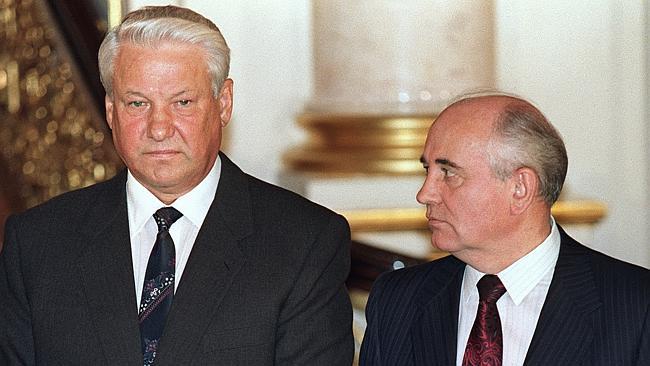Gorbachev’s New Russia reveals same old vision
Mikhail Gorbachev appears not to realise that what was once new thinking is now rather old hat.

Long-time Russia watcher John Lloyd, a journalist with Britain’s Financial Times, has captured the essence of Mikhail Gorbachev’s book The New Russia in one word: ‘‘garrulous’’.
Gorbachev was always long-winded. In this tome, he continues his struggle to glorify perestroika and to remain relevant in defining Russia’s place in the world. The book is not about the new Russia; it is more a rambling manifesto for Gorbachev’s brand of perestroika and his ‘‘New Thinking’’.
For those unsure of what perestroika (‘‘restructuring’’ in English) is, they should start not at the beginning of the book but at the conclusion. Here what is evident throughout the book becomes explicit.
Gorbachev believes the world needs socialism with a human face, just as the Soviet Union did in the 1980s. And it needs democracy; without democracy Russia is doomed.
Yet, as Gorbachev justifies his initial support for Vladimir Putin, he concedes that Russia also needs a strong president. In 2000 it was to clean up the mess left behind by Boris Yeltsin. Now, it is because of ‘‘Russian traditions, the mentality of the people, the vastness of the land, and the role and responsibility of the Russian state in the world’’.
Consistent with his repeated calls for more democracy, Gorbachev argues for a strong parliament and independent judiciary but, as his review of the politics of the past quarter of a century shows, these are as elusive as ever.
This retelling also reinforces, though it aims to dispel, the plain fact that Gorbachev is a peripheral figure in post-Soviet Russia. While his international network of dignitaries has provided him platforms on which to pontificate, his words have had little effect. Other gatherings of former leaders have also struggled to do more than discuss and analyse problems and conflicts; in Gorbachev’s case there is a large dose of preaching his lost cause and not much insight.
This is on display in the slabs of rambling articles and interviews reproduced in this book. These reveal an obstinacy that was part of Gorbachev’s downfall. Not, for example, even now to understand the nationalist genie he unleashed in the late 80s can only cast doubt on his interpretations of contemporary events. After all, it was this that finally brought about the collapse of the Soviet Union, which Putin considers one of the greatest geopolitical catastrophes of the 20th century.
The book has three parts: the first considers the 90s and Gorbachev’s failed attempts to re-enter the political fray, as a presidential candidate and then head of a new Social Democratic Party. It also critiques, with considerable vitriol, the Yeltsin years, singling out the catastrophic economic consequences of shock therapy, the decline in democracy and the rise of the oligarchs.
The second asks: whither Russia? The answer proffered is that Russia must have another perestroika, a root-and-branch transformation of the system.
In the past few years Gorbachev has repeatedly called for free and fair elections as the mechanism to instigate change. Yet, as he does concede, such democratic reform is the last thing the present elite would initiate: ‘‘in Russia today the executive branch lords it over society, beholden to no one”.
The third part of the book is called Today’s Uneasy World. It launches into a promotion of New Thinking: ‘‘the ideas and principles that I and my colleagues had offered the world in the latter half of the 1980s … it was New Thinking that made possible putting an end to the Cold War. I believe the world still very much needs it today.’’ New Thinking is basically ‘‘modern humanism, its purpose to move us toward a more stable, safe, more just and human society’’.
Tucked in between the idealism and the accounts of his travels are points that bear thinking about in the fractious world of 2016.
Gorbachev argues that the expansion of NATO has irreparably damaged relations between the West and Russia. He sees it as the reversal of a European strategy to move beyond the Cold War, as well as the cause of domestic problems in Russia. These include the conflict with Ukraine, which Gorbachev attributes to the EU wooing Kiev. He laments the persistence in US foreign policy of resorting to military solutions and of rejecting the notion of Russia as a partner in international affairs.
Like Russia’s present leaders, Gorbachev asserts that Russia deserves a place at the table of great powers, yet his gaze remains fixed on Europe and North America. He makes no mention of Putin’s Eurasian vision; indeed, today’s China receives surprisingly short shrift, perhaps because the Chinese have seen no reason to fete a leader from a bygone era.
The New Russia is a gauche defence of perestroika, presented as an idealistic and somewhat anachronistic version of democratic socialism.
The memoir reveals the flawed Gorbachev that, the smattering of complimentary letters presented in the book notwithstanding, most Russians have always known. For those who remember him as the hero who ended the Cold War, his survey of the 25 years since only confirms the obvious difficulties Russia is having in overcoming its authoritarian past.
Francesca Beddie was an Australian diplomat in Moscow from 1989 to 1993.
The New Russia
By Mikhail Gorbachev
Translated by Arch Tair
Polity Press, 464pp, $49,99 (HB)



To join the conversation, please log in. Don't have an account? Register
Join the conversation, you are commenting as Logout